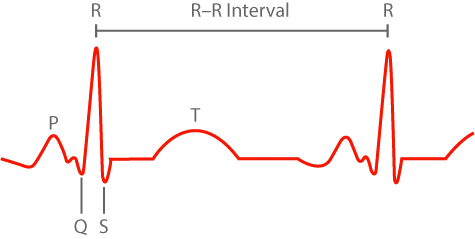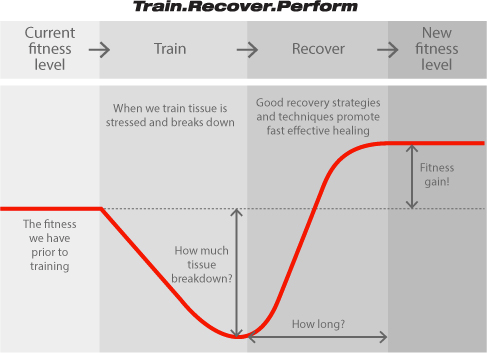Overtraining leads to injury, illness and diminished performance. The body can endure just so much continual physical stress before it begins to break down.
So how do you know when to train and when to rest?
The answer is heart-rate variability (HRV), which measures the time-gap between your heartbeats when you’re resting. The heart, in fact, speeds up when you inhale, and slows down when you exhale. The difference is known as heart-rate variability. A healthy, well-rested body will produce a wider gap than a stressed out, over trained body.

Heart rate variability is measured by calculating the time between R wave peaks on an ECG trace
Today, new technology such as ithlete allows athletes to more accurately monitor their HRV. In just 60 seconds, the ithlete app provides an independently validated measurement of your HRV and resting heart rate, graphs of your results, stores your personal information, and allows for daily testing comparing your weekly and monthly results. As such, ithlete warns you if HRV worsens, indicating an autonomic imbalance and the need for additional rest that day, or an easy rather than hard workout. As you would expect, autonomic balance, as measured by HRV, is maintained following an aerobic workout; however, after an anaerobic workout, autonomic balance is slightly disturbed until the body recovers. In addition, athletes who maintain a good balance of autonomic function, as indicated by HRV, perform better.

The number presented by ithlete is on a scale from 1-100 and represents your HRV. Unlike resting-pulse, a higher HRV number is better. It’s not a percentage though, and an ultra-fit person could go over 100.
The ithlete number is created from a standardized measurement of parasympathetic heart rate variability (lnRMSSD). Increased parasympathetic activity enables recovery.
Factors that decrease HRV:
- Physical stress from intensive training
- Mental stress ie work, life stress
- Insufficient recovery, rest & sleep
- Poor diet (eg. too many refined carbs, not enough fruit, vegetables, fish)
- High altitude, dehydration, jetlag
- Excessive alcohol, hangovers
- Smoking
- Illness, inflammation and disease
- Increasing age
Factors that increase HRV:
- Recovery, rest and sleep
- Higher aerobic fitness levels
- Relaxation (including social activities, listening to music, yoga & breathing exercises)
- Good nutritional choices (especially, fish, fruits & vegetables). A recent study on the benefits of the Mediterranean Diet found increased HRV to be closely associated with improved heart health
Athletes are likely to have average scores of 65 or higher, with endurance competitors in the 80s to mid 90s on the ithlete scale.

I’d like to suggest that it is not fish specifically but rather healthy fats such as omega-3s Also found in plants such as flax seed/meal and chia seed/meal. In extensive research I have switched to a plant based Whole Foods diet. Looking at foods that decreas oxidative stress and inflammation has huge effects training and performance; marked by changes in HRV readings. Meat and animal products (even casein and whey) is showing oxidative stress on the body. It is not as simple as that, but in the case of anti-oxidant rich foods (and in some instances how we chooses to cook and eat them) there is substantial evidence to their effects as “anti” “oxidants” on HRV, recovery, and inflammation. I would love to help put together and article on this for ithlete and HRV.
Hi Teddy,
Good call on the fish oils. In fact there was a BBC TV program last night where they compared the effects of oily fish, Omega-3 supplements & white fish (control) on a group of volunteers. The study is detailed here http://www.bbc.co.uk/programmes/articles/341ZWQjRVCyky3V5cfFpS4N/how-can-i-get-more-omega-3-into-my-diet-and-how-much-difference-will-it-make-to-my-health
One of the interesting conclusions for me was that most (British) people don’t get enough omega-3s (at least 200mg EPA+DHEA pd).
We’d love to have you pen a guest blog on this perennially interesting topic, we can help you get it into shape if you can send a draft to Laura[at]myithlete.com
thanks!